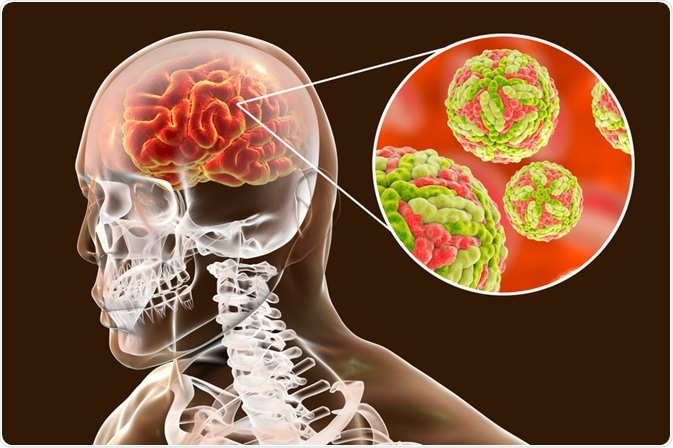Japanese encephalitis (JE) is a dangerous form of brain inflammation caused by the Japanese encephalitis virus, which is common in Asia and the West Pacific territories. The JE virus is a flavivirus, which brings it into the same family as the dengue virus. The life cycle of the virus is completed in two hosts, the mosquito and another vertebrate, whether man, pig or wading bird. The bites of culex mosquitoes transmit the virus, mainly by C. tritaeniorhynchus.
 Image Credit: Kateryna Kon/Shutterstock.com
Image Credit: Kateryna Kon/Shutterstock.com
However, not all human infections cause severe encephalitis. There is a well-defined transmission season, namely, the warm season in temperate Asia, but the rainy season in tropical parts of the continent. It is more common around pig farms and rice paddies. Children are the most common victims, and most adults in endemic areas are already immune. However, JE can occur at all ages.
The incubation period of JE is 5-15 days. Most JE virus infections are asymptomatic or appear to be mild. Encephalitis results from only about 1 in 250 infections. The symptoms of encephalitis include headache, high fever, disorientation, coma, tremors and seizures. The mortality of JE is about 25% in people with encephalitis symptoms.
Diagnosis and treatment
Diagnosis requires a spinal tap and testing of cerebrospinal fluid for the virus antigens. Blood tests are also available. Treatment is supportive, with pain relievers, antipyretics, fluids and rest. Supportive care is required for encephalitis. Permanent disability in the form of brain or mental instability is found in 30-50%. Survivors may be unable to speak, suffer recurrent seizures, be paralyzed or be impaired intellectually or behaviorally. In pregnancy, the infection may harm the fetus.
Japanese Encephalitis Virus (JEV) | Transmission, Pathogenesis, Symptoms, Diagnosis, Treatment
Prevention
Prevention of JE includes personal protective measures and the use of JE vaccine. Personal protection includes the use of long sleeves and pants, insect repellent creams and avoiding being outdoors during the times of peak mosquito bites, which are early evening and morning. Sleeping should be inside air-conditioned rooms or in rooms with screened windows and doors. If neither of these is available, the use of mosquito nets and insect repellent sprays is advised.
JE vaccine is used when a traveler is at risk of acquiring infection with JE virus, such as travelers who are bound for rural areas, or plan to engage in camping or hiking activities, or will not have access to screened rooms. Vaccination is also recommended for health and lab workers who are at risk. Vaccination is performed with two doses 28 days apart. JE vaccine offers over 90% protection.
Vaccines are of four types:
- Inactivated vaccines – mouse brain-based or cell-based vaccine
- Live vaccines – chimeric or attenuated
The vaccine is generally safe, and most vaccine reactions are mild local effects, such as redness and some pain at the injection site, muscle aches and fever. Severe reactions are rare.
References
Further Reading
Last Updated: May 14, 2021